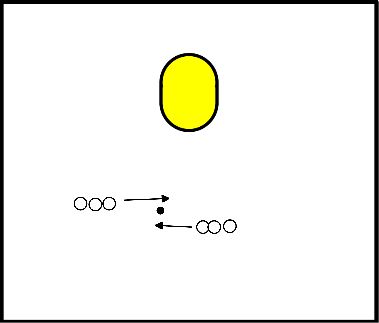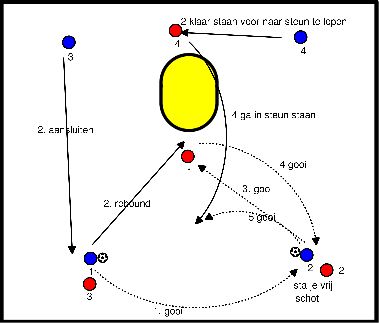Korfball drills
- Make 2 or 3 teams.
- Each team gets 10 pawns.
- The players shoot from their own chosen distances and put a pawn on each spot where they have scored.
- When one team has finished, the teams change baskets. (Even if the other baskets have not yet placed all 10 pawns).
- Now the players shoot the pawns away from the other team by scoring from that distance.
- Winner who shoots away the pawns first.
- Make 2 rows of players.
- Players walk towards each other and pass the ball.
- Shorten the passing distance until the ball is hanging still in the air.
- The passing is then more like a short tap.

Objective:
- From 4-0 position to take action.
Rules:
- You play around and create an attack opportunity in front of the basket.
- After the first action, start the second action.
- After second action, return to 4-0 position.
- Everyone stays in motion.
Actions to practice:
- Behind.
- Cross.
- Left/right.
- Pass from 4-0.
- A.
- B.
- Opening.
See drawing for from 4-0 to 3-1 to 2-1-1.
Blue is 4-0.
- Player 1 throws to player 2.
- Player 1 puts in rebound.
- Player 3 fills in place of player 1.
- Player 4 behind the basket.
- Player 2 throws to player 1.
- Player 1 throws to player 2 or 3, they make an evasive move. (where possible shot).
Red is 3-1.
- Player 4 enters the support.
- Player 2 or 3 throws to 4.
- Player 2 and 3 make an action for a goal attempt.
- Player 1 catches a shot or makes sure she is away from a pass, can score via diversion after a missed pass.
- Player 4 makes a run through after a pass through.

- Players run/dribble around a set square. (poles/pawns, sufficient distance from each other).
- Players are given a list of commands in advance, with a corresponding number.
- The trainer calls out a number randomly, players carry out the assignment.
- You can adjust the number of missions and the missions themselves.
- Example of assignments.
- Tapping the ground.
- Jump in the air.
- Sprint to the next pole.
- 1 burpee.
- Backwards as if you are defending until the next pole/pawn.
- Players play 4-0 around the post.
- Player 1 takes the catch immediately after a pass.
- The next player to pass the ball takes the pass, but is "defended in front" and cannot avoid it.
- The player goes behind the post, the "defender" stays in front of the post, the player behind the post pulls away, gets the ball and shoots.
- Ball is caught, played out and the exercise is done again.
- This can be done with or without defenders.
- With defenders, the defenders must over-defend and stay in front of the post when the player moves backwards.
- Without defenders, make sure that attackers keep making the correct movements and do not immediately move backwards to move away, but only when they have been "pre-defended
Objective:
Set up attacks in overtime situations
Rules:
- Make sure the offense always has 1 more person than the defense (3-2, 4-3, 4-2 etc.)
- Gives the offense a task:
- E.g. score within 5 passes, score after setting up an action, score from the rebound.
- Gives the defense a task:
- E.g. intercept the ball within 5 passes, defend in front.
- Decide if you can go for a defensive goal.
- Indicate with cones where the lines are.
- Agree when offense switches with defense:
- After X minutes, after X goals, after X interceptions.
- 4 against 4 on 1 pole.
- The attacking team consults before each attack.
- They have to agree on a plan for the next attack.
- Who fills what position, what tactics (e.g. attacking in 3-1 or continuing to 2-2), do we move the ball to the back or do we attack in front with 2 people etc.
- Encourage them to have a basic plan.
- Let them think of alternatives if something doesn't work out.
- It is not the intention that they do not go for the ball after a goal attempt
- The goal is to score, so they should also try to get the ball when a goal attempt goes wrong
- Variation
- Give the defence an order and see if the attack picks it up and adapts.
- Each player a hoop and a pawn.
- Player puts the pawn about 5 metres from the hoop.
- Player turns the hoop and sprints to the pawn.
- Player must be back before the hoop is finished.
- If successful, move the pawn one metre away.
- Who can achieve the greatest distance?
- Each pair has a ball, a basket and 3 hoops.
- The pair stands about 10 metres in front of the basket.
- On a signal, player 1 throws the three hoops and the ball towards the basket.
- When the ball is thrown, player 2 sprints to the ball and shoots from each hoop until he has scored.
- Then player 2 takes the hoops and the ball and runs back to the start.
- Player 2 throws and player 1 shoots.
- Who finishes first.
- After that of course a chance for revenge.
- A pair must make a continuous run of 10 penalty throws.
- Missing is back to 0.
- In the time this pair needs the other pairs will do shooting exercises e.g.
- Distance shot. (counts for 2)
- Pass.
- Chance.
- Then change.
- Who scores the most?
Three warm-up exercises for flexible muscles.
These exercises are for back, back and hamstring and back legs, ankles and arms.
- Dangling pose. (back)
- Both feet hip-width apart with feet forward.
- Hands go up sideways.
- Tilt your pelvis forward and bring your hands to the ground.
- Try to feel the breath in your back and hold for 1 minute.
- Then come up at a slow pace, vertebra by vertebra.
- Down dog. (hamstring and back)
- Hands and knees on the ground. (Hips above the knee and hands straight under the shoulder))
- Plank on your hands.
- Backside up and back, leaving hands where they are.
- Hold for 20 seconds and then back in reverse.
- Triangle pose. (back, legs, ankles and arms)
- Stand arms and legs wide apart. (Legs at wrist width)
- Turn right foot 90 degrees to the right and point left foot forward.
- Ankles stay in 1 line.
- Reach to the right and move your right hand to your calf and look up at your left hand. (Arms stay at 180 degrees)
- Hips stay forward.
- Stand still and come up.
- Exercise 1 and 2 we do 3x, exercise 3 left and right.
- 4 hurdles against each other in a 4 side.
- Jump with two legs over the first hurdle.
- Jump left over the hurdle and jump back.
- Jump straight forward over the hurdle and back again.
- Jump right over the hurdle, turn right and make a sprint to the pawn.
- We do this 8 times.
- 10 hoops spread over the ground.
- You jump alternately with your left and right leg into a hoop and stay on that one leg for 3 counts.
- Your face is always facing the same direction.
- After the last hoop you sprint to the pawn.
- We do this 8 times.
- 6 cones next to each other with 50 cm distance between them (when this group is ready, parts 4 and 5 stop).
- You step over the pawn in the space between first your right foot and then your left foot. (keep your back straight)
- This way you step over all 6 cones.
- Then you sprint to the pawn.
- The next round you face the other way and first you go over the pawn with your left foot and then with your right foot.
- Do this 4 times right and 4 times left.
- Hat run. (brisk pace about 50%)
- You start at a green hat.
- At green you go forward.
- At orange you go left.
- At white you go backwards.
- With blue you go to the right.
- At every other colour you choose your own side.
- Pass the Frisbee and make sure it is caught.








